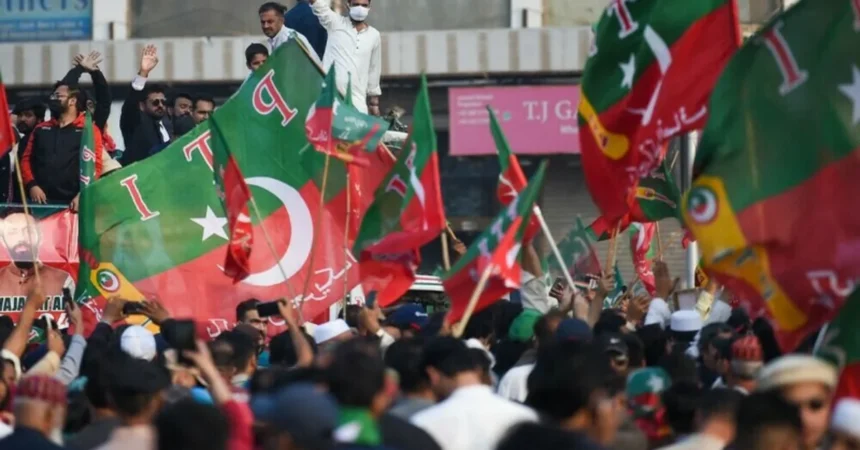Introduction
In a significant development on the political front, Pakistan Tehreek-e-Insaf (PTI) has decided to register a robust protest against the draft of constitutional amendments proposed by the government. This decision marks a new chapter in the ongoing political tug-of-war between PTI and the ruling parties, as both sides seek to assert their influence on the constitutional framework of Pakistan.
- Introduction
- Overview of the Draft Constitutional Amendments
- PTI’s Stand on the Constitutional Amendments
- Imran Khan’s Role in the Protest Movement
- The Potential Impact on Pakistan’s Political Landscape
- Public Response to the Constitutional Amendments
- Legal Implications of the Constitutional Amendments
- PTI’s Strategy for the Protest
- The Role of Opposition Parties in the Protest
- Government’s Response to PTI’s Protest
The proposed amendments have stirred a fierce debate among political circles, with PTI viewing them as a threat to the democratic process. This article delves into the details of the draft amendments, PTI’s stance, and the broader implications for Pakistan’s political landscape. We will also explore the potential outcomes of PTI’s protest and how it may reshape the country’s democratic norms.
Overview of the Draft Constitutional Amendments
The draft of constitutional amendments introduced by the government includes several changes that seek to restructure certain political processes and institutions. While the specific details of the amendments are yet to be fully disclosed, early reports suggest that the government is aiming to make changes related to the electoral system, judicial appointments, and parliamentary powers.
The amendments, if passed, could significantly alter the way elections are conducted and how political power is distributed. One of the most controversial aspects of the amendments is the proposed changes to judicial appointments, which could potentially diminish the independence of the judiciary. Additionally, there are concerns that the changes might centralize more power within the ruling party, sidelining opposition voices in the democratic process.
PTI’s Stand on the Constitutional Amendments
Pakistan Tehreek-e-Insaf, led by Imran Khan, has taken a firm stand against the proposed constitutional amendments. PTI has expressed concerns that these changes undermine the democratic values that the party stands for. According to PTI leadership, the amendments are designed to erode checks and balances within the political system, giving the ruling party unchecked power.
PTI’s decision to protest comes at a critical time when the party is trying to regain political momentum after a series of setbacks. The proposed amendments have provided an opportunity for PTI to rally its supporters around a unifying cause, namely the defense of Pakistan’s democratic integrity. The party sees the protest as a means to prevent what it views as undemocratic changes from being implemented without broader consultation and public debate.
Imran Khan’s Role in the Protest Movement
Imran Khan, the former Prime Minister of Pakistan and chairman of PTI, remains a key figure in the protest movement against the constitutional amendments. Khan has long been an advocate for transparency and democratic governance, and his vocal opposition to the proposed changes resonates with a significant portion of the electorate.
Khan’s charisma and leadership have historically galvanized his supporters, and this protest is expected to be no different. By positioning himself as a defender of democracy, Khan aims to rebuild his political base and challenge the current government’s attempts to consolidate power. His speeches, rallies, and social media campaigns are likely to play a crucial role in mobilizing PTI supporters across the country.
The Potential Impact on Pakistan’s Political Landscape
The proposed amendments and PTI’s subsequent protest could have far-reaching consequences for Pakistan’s political landscape. If the amendments are passed, they could fundamentally alter the country’s democratic structure, making it more difficult for opposition parties like PTI to challenge the ruling government.
On the other hand, PTI’s protest could force the government to reconsider the amendments or at least engage in a more transparent and inclusive process. The protest could also spark a broader movement that brings other opposition parties into the fold, creating a united front against the government’s perceived overreach.
The political instability resulting from this confrontation could lead to a period of uncertainty in Pakistan. The government’s ability to pass the amendments, as well as PTI’s capacity to mobilize large-scale protests, will determine the trajectory of the country’s political future.
Public Response to the Constitutional Amendments
The proposed amendments have elicited mixed reactions from the public. While some segments of society view the changes as necessary to ensure political stability and efficiency, others are concerned about the potential erosion of democratic institutions. Many civil society organizations and legal experts have expressed reservations about the amendments, particularly those related to judicial independence.
PTI’s decision to protest has found support among its core base, particularly among those who view the current government as authoritarian. Social media has been abuzz with discussions on the amendments, with hashtags like #DefendDemocracy and #StopTheAmendments gaining traction. The public response to the amendments, especially from younger, more politically active citizens, will play a significant role in shaping the outcome of PTI’s protest.
Legal Implications of the Constitutional Amendments
The proposed constitutional amendments also carry significant legal implications. Legal experts argue that changes to the judiciary could undermine the separation of powers, a fundamental principle of Pakistan’s constitution. By potentially allowing the government greater influence over judicial appointments, the amendments could weaken the judiciary’s role as a check on executive power.
Moreover, the amendments related to the electoral system could alter the way future elections are conducted, potentially making it harder for opposition parties to gain a foothold in the political process. PTI’s protest is partly motivated by the fear that these legal changes could institutionalize the ruling party’s dominance, effectively sidelining the opposition in future electoral contests.
PTI’s Strategy for the Protest
PTI’s strategy for the protest involves a multi-faceted approach that includes mass rallies, social media campaigns, and legal challenges. The party is expected to organize a series of nationwide protests, drawing large crowds of supporters to demand the withdrawal of the proposed amendments. These protests will likely be accompanied by speeches from PTI leadership, with Imran Khan at the forefront.
In addition to street protests, PTI plans to leverage its strong presence on social media to amplify its message. Hashtags, online petitions, and viral videos will be used to galvanize public opinion and put pressure on the government. The party is also exploring legal avenues to challenge the amendments in court, arguing that they violate the constitution and threaten democratic norms.
The Role of Opposition Parties in the Protest
While PTI is leading the charge against the constitutional amendments, other opposition parties may also join the protest movement. Although PTI has often been at odds with other opposition groups, the seriousness of the proposed amendments could lead to a temporary alliance. Parties like the Pakistan People’s Party (PPP) and Pakistan Muslim League-Nawaz (PML-N) have also expressed concerns about the amendments, albeit less vocally than PTI.
A united opposition front would significantly increase the pressure on the government to reconsider the amendments. It remains to be seen whether PTI can successfully rally other opposition parties to its cause, but the potential for a broader coalition against the amendments is an important factor to watch.
Government’s Response to PTI’s Protest
The government’s response to PTI’s protest will be critical in determining the outcome of this political battle. Thus far, the government has defended the amendments, arguing that they are necessary for the smooth functioning of the state. However, the prospect of large-scale protests may force the government to reconsider its stance.
The government’s options include engaging in dialogue with PTI and other opposition parties, modifying the amendments, or pushing ahead with its plans despite the protests. The latter option could lead to a significant escalation of tensions, potentially resulting in clashes between protesters and law enforcement.
The decision by PTI to protest against the draft of constitutional amendments is a pivotal moment in Pakistan’s political history. The outcome of this confrontation will have lasting implications for the country’s democratic institutions, political parties, and legal framework. As PTI prepares to take to the streets, the nation watches closely to see whether the government will relent or push forward with its controversial plans.
Whether the amendments are ultimately passed or withdrawn, this episode underscores the importance of transparency, inclusivity, and public participation in the constitutional process. The stakes are high, and the actions of both PTI and the government will shape Pakistan’s political landscape for years to come.
#PTIProtest #ConstitutionalAmendments #ImranKhan #DefendDemocracy #PakistanPolitics #OppositionProtest #SaveDemocracy #ConstitutionalCrisis







